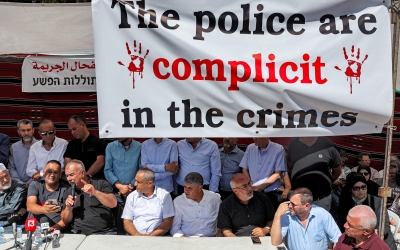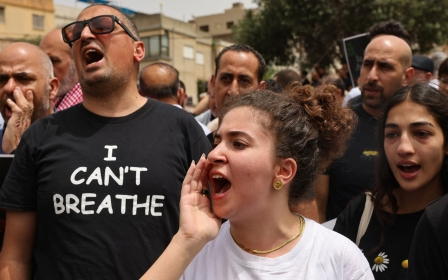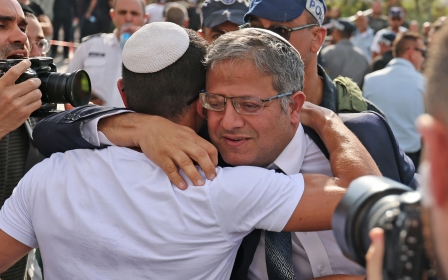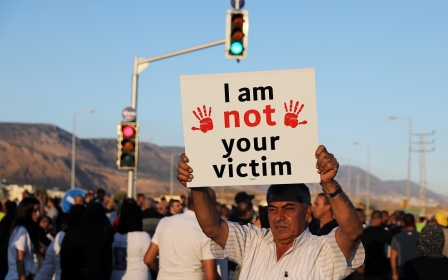Palestinians march in Tel Aviv against rise in organised crime
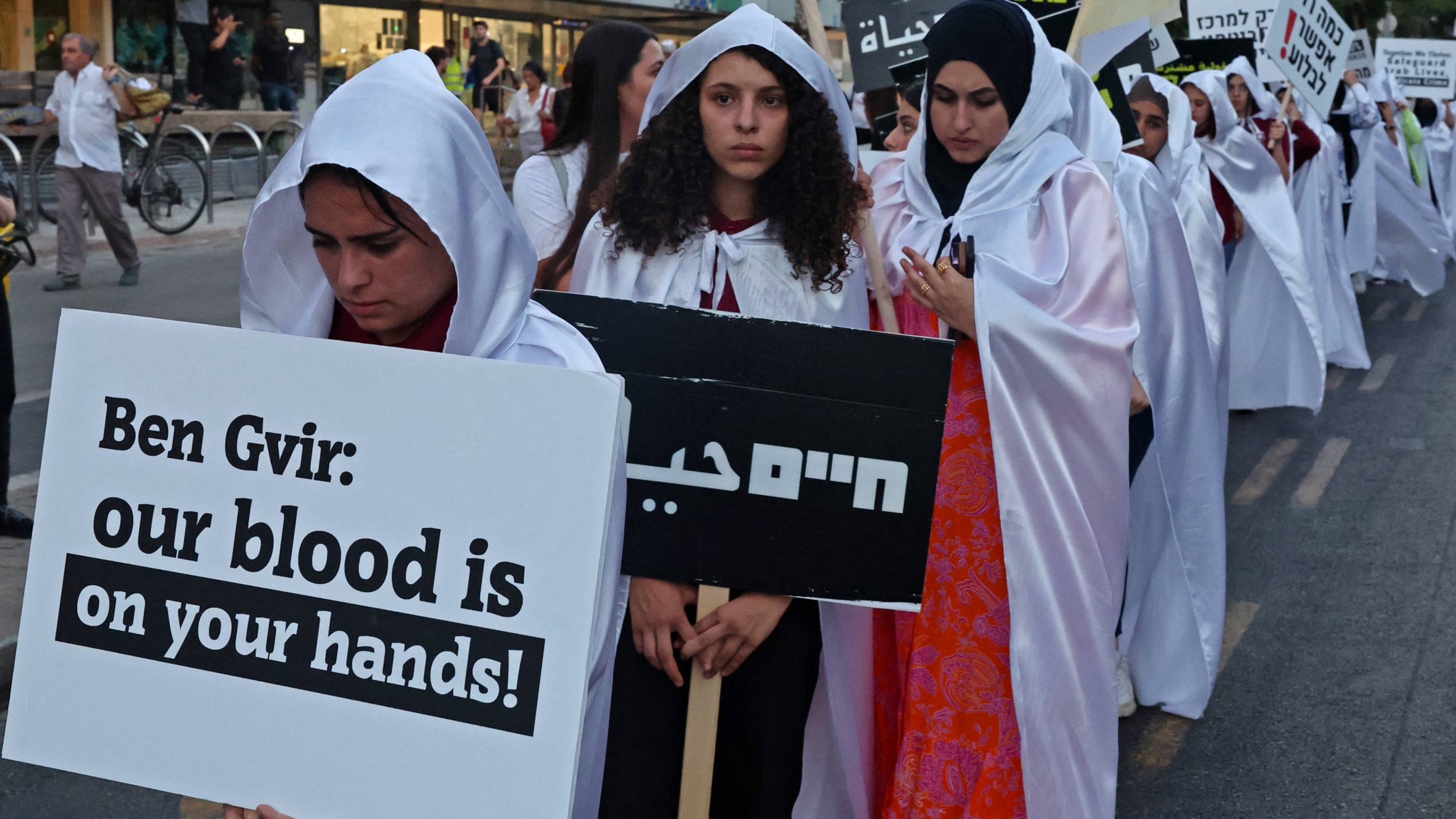
In a surreal scene on Sunday, thousands of people joined the silent 'March of the Dead' through Tel Aviv while carrying dozens of coffins on their shoulders to protest against the organised crime wave that has engulfed Palestinian towns and cities.
For nearly two decades, Palestinian citizens of Israel have lived under the threat of organised crime in the Galilee, al-Muthallath and the Naqab (Negev), but the past 10 years have been particularly violent.
Making the situation even more terrifying for the community are videos of violence, murder or extortion being shared online, stripping people of any sense of personal security.
Since the beginning of the year, at least 141 Palestinians have been killed by organised crime gangs, setting a record-high rate of crime-related deaths in the community and leaving two million people living in a constant state of anxiety.
The vast majority of the killers have not been caught, while only 15 percent of organised crime cases have resulted in indictments. The Israeli police have been heavily criticised for their inaction in fighting organised crime. In June, five people were shot and killed at a car wash in the town of Yafia, near Nazareth, including a 15-year-old boy, in one of the deadliest crime-related shootings witnessed in the country in recent years.
July, meanwhile, saw the highest rate of murders than any other month in recent years, with 28 Palestinian citizens of Israel killed, out of the 33 murders committed in the country, according to Haaretz.
During the march on Sunday, Palestinian families, activists, left-wing Jews, and civil society organisations called for action against organised crime, and denounced the police's failure to protect Palestinian citizens.
Protesters carried 141 coffins in memory of the victims killed since the start of the year.
A police problem
Two years ago, nursing student Ahmed Hijazi, 21, was killed in the crossfire during a shoot-out between Israeli police and masked gunmen in an alleyway in the city of Tamra, in the Galilee. His death at the time led to a huge demonstration against both gun violence in Palestinian towns and the way police had been handling organised crime. The case also drew attention in Israeli media about rising violence in Palestinian communities in Israel.
Hijazi's brother, Jaber Hijazi, who participated in the March of the Dead, told Middle East Eye: "It is important for us, as a family, to tell the world that our brother didn't die exactly like other victims. Today we came to Tel Aviv to raise the cry of the victims in Arab society.
"We reject all types of gangs that have swept our towns. Israeli authorities are primarily responsible because they have tolerated them from the beginning."
'This government wants the Palestinian society to bleed both in the occupied territories by settlers, and within 1948 borders by criminal organisations'
- Offer Cassif, Knesset member
Many Palestinians accuse Israeli authorities of neglect and complicity with criminals in a bid to weaken the social fabric of their community and make them feel unsafe.
In 2021, an unnamed senior police officer reportedly said the perpetrators of crimes in Palestinian towns "are mostly Shin Bet informants", which limits the police's ability to respond to gang activities.
"In this situation, the police are bound because those informants, who enjoy immunity, cannot be touched,” the officer was quoted as saying by Israeli media.
The security service agency has denied the claim.
The officer reportedly made the comment during a high-level meeting at the national police headquarters ahead of a seperate meeting between the police commissioner, Kobi Shabtai, and then public security minister Omer Barlev.
During last year's election campaign, far-right National Security Minister Itamar Ben Gvir, who oversees the police, promised to address the root cause of the violence in Palestinian society, but as the crime wave increases, critics say that neither he nor Israel’s ultra-nationalist government have taken any measures to protect Palestinians.
"The Arab-Palestinian society in Israel is totally neglected by the police and especially the government," Knesset member Offer Cassif, who took part in the protest in solidarity with the Palestinians, told Middle East Eye.
"I call this situation active negligence because, in my point of view, it is not simply a negligence of not doing anything, on the contrary, it is 'not doing' in order to achieve something, this is a policy.
"The Palestinian society has been... discriminated by the state from day one, but this government specifically wants the Palestinian society to bleed both in the occupied territories by the terrorist settlers, and within 1948 borders by criminal organisations, both situations are connected."
'Draft to the army'
The protest on Sunday saw parents of victims, activists and officials deliver speeches. But the crowd was baffled when former Likud lawmaker and justice minister Meir Sheetrit took to the stage and called on Palestinian citizens of Israel not only to take part in demonstrations against the government's planned overhaul of the judiciary, but also to enlist in the army.
“Join in. Learn. Draft to the army,” Sheetrit said, amid cries of rejection from protesters.
Palestinians have suffered for decades under discriminatory laws and practices imposed by the Israeli state.
According to the NGO Abraham Initiatives, crime and violence in the community are a result of "under-policing and tense relations with the Israeli police".
The organisation says that 50 percent of overall violent crime in the country affects Palestinians, even though they comprise only 20 percent of Israel's population.
Prime Minister Benjamin Netanyau said in June that he plans to bring in the Shin Bet to help fight the crime wave.
However, the High Follow-Up Committee opposed potential support from the Shin Bet, which they said could be used as a pretext to put Palestinian citizens of Israel under further state scrutiny.
"I think this is the worst situation after the catastrophe of 1976, Land Day, but it is very important that we remove ourselves from apathy - simply because we live in [a] constant state of fear," said Mohammed Haj-Yehia, a professor of social sciences at the Hebrew University of Jerusalem.
Middle East Eye propose une couverture et une analyse indépendantes et incomparables du Moyen-Orient, de l’Afrique du Nord et d’autres régions du monde. Pour en savoir plus sur la reprise de ce contenu et les frais qui s’appliquent, veuillez remplir ce formulaire [en anglais]. Pour en savoir plus sur MEE, cliquez ici [en anglais].


